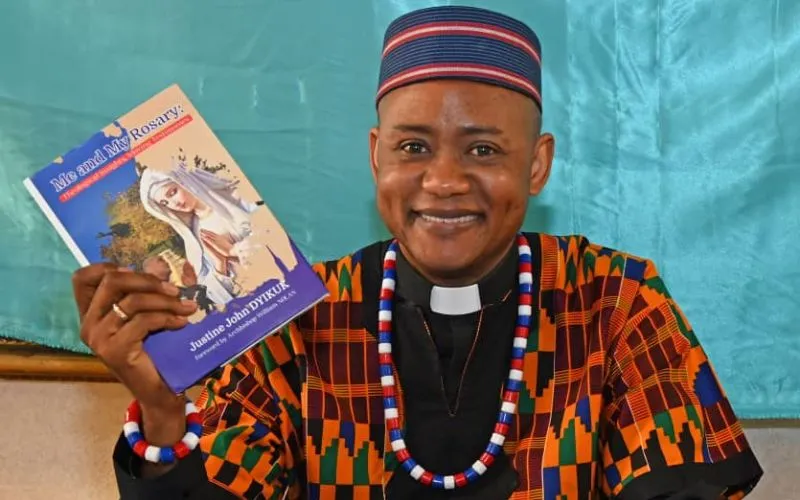“My hope is that readers can get fresh perspectives in praying the Rosary so that it is not just a mechanical exercise for them,” he said.
He posed, “Are we able to identify something joyful in our lives when we meditate on the joyful mysteries? And are we able to share the same joy with our brothers and sisters? When tragedy strikes, how does it impact our faith? Do we help others unite their pain with that of Jesus when we meditate on the sorrowful mysteries?”
“How do we respond to the invitation to be disciples of Jesus when we pray the Glorious mysteries? And when we meditate on the Luminous mysteries, do we reflect on the day of our baptism and our call to be missionaries?” the Nigerian Catholic Priest further posed.
Sharing about his conversion when he started praying 20 decades of the Holy Rosary daily, Fr. Dyikuk, who survived the Boko Haram attack in 2011 said, “ I prayed the Rosary daily but I wasn't as conscious of it as I am now. I have seen numerous fruits in my life from the time I started setting aside one hour every day to pray the Rosary.”
“Praying the Rosary slows down one’s will in committing sin. The Rosary connects you to the mysteries of Christs and through it, Our Lady reminds us to do the will of her son,” he said.
(Story continues below)
Fr. Dyikuk’s nine-chapter book provides the history of the Holy Rosary, reflecting on what the Holy Fathers have said about devotion to the prayer. The book encourages observing the May and October months set aside for devotion to the Holy Rosary and revisits the apparition of Fatima to assure world peace through Mary’s intercession.
The book also provides a relationship between the Rosary Prayer and Holy Mass. In chapters three, four, five and six, the Nigerian Catholic Priest reflects on the different mysteries of the Holy Rosary, arguing that each decade of the Holy Rosary must be connected to one’s daily experiences and the experiences of those around them.
Chapter seven is where he provides his testimonies about the power of the Holy Rosary. In chapter eight, he provides testimonies of others who have had divine encounters from praying the Holy Rosary.
In chapter nine, Fr. Dyikuk provides recommendations to boost Marian devotion especially through Praying the Holy Rosary. He recommends, among other sets of proposals, that Catholic communities promote online rosaries “to sanitize the social media spaces that are full of negative content.”
The book “aspires to contribute to the already established Mariology or Marian Theology”, the author has told ACI Africa.
In chapter two titled, “The Rosary and Holy Mass: In search for drama, prose, and poetry,” the Catholic Priest deploys the three genres of literature – drama, prose, and poetry to explain that the Holy Mass is “drama” while the Rosary is “poetry of the Mass”.
Drama because “Jesus, who is the victim, the priest and lamb of sacrifice offers Himself as a living sacrifice,” he says in the book, and further explains, “We, unworthy active participants in the liturgy become beneficiaries.”
Fr. Dyikuk argues that the Holy Rosary is “poetry” of the Holy Mass because “it x-rays the joyful, sorrowful, glorious and luminous mysteries of Christ which invites Christians to connect their daily experiences with these mysteries for profound spiritual benefits.”
In a note shared with ACI Africa on Monday, June 24, Fr. Dyikuk’s book committee chair, Helen Border, indicated that the events of the June 1 book launch were organized to promote praying the Holy Rosary “which is dear to Fr. Dyikuk’s heart," to mark his 15th Priestly anniversary, and to raise funds to support the Nigerian Catholic Priest’s final year Ph.D. tuition “since he is a self-funded student.”
In the June 24 interview, Fr. Dyikuk told ACI Africa that the book would “soon be on Amazon”, adding that hundreds of copies have already been purchased in the UK.
Agnes Aineah is a Kenyan journalist with a background in digital and newspaper reporting. She holds a Master of Arts in Digital Journalism from the Aga Khan University, Graduate School of Media and Communications and a Bachelor's Degree in Linguistics, Media and Communications from Kenya's Moi University. Agnes currently serves as a journalist for ACI Africa.








